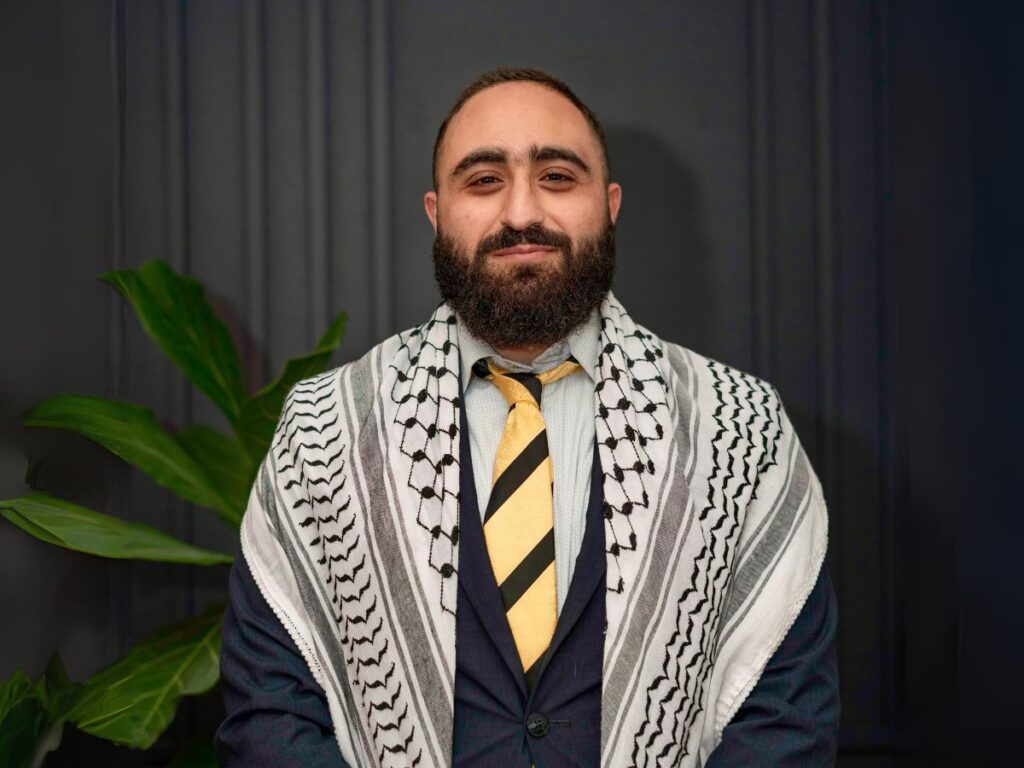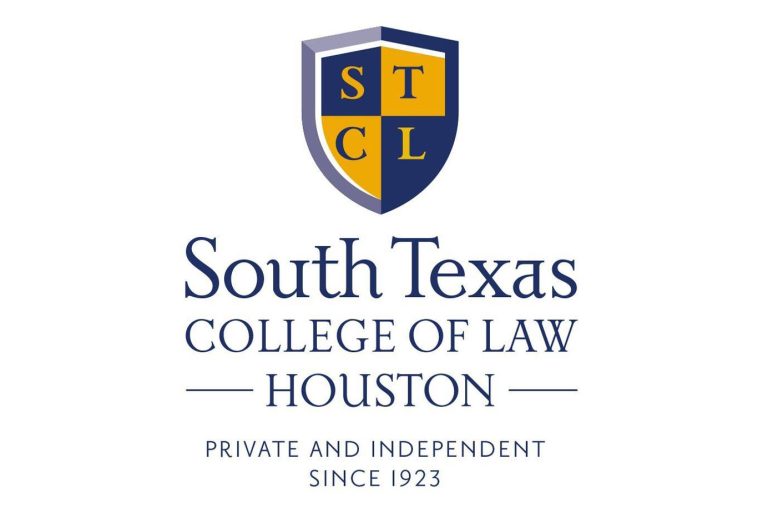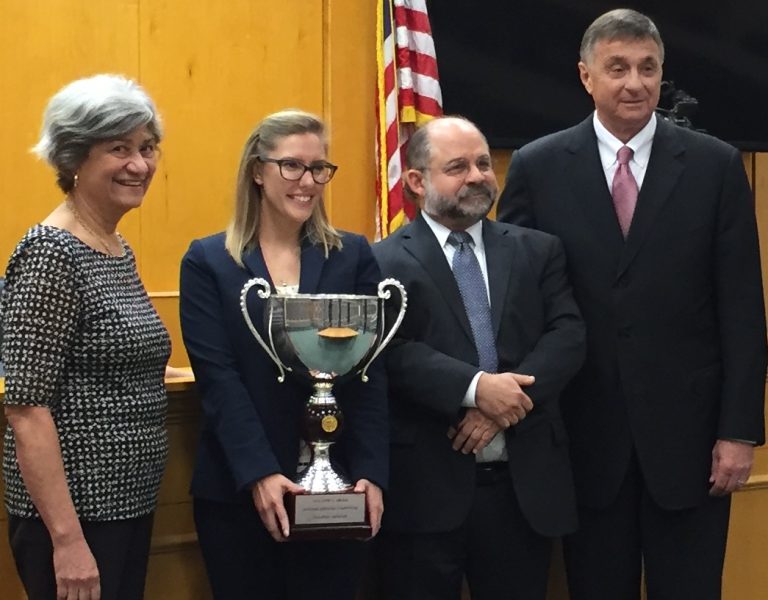During the month of April, South Texas College of Law Houston commemorates Arab American Heritage Month with student stories that highlight diverse cultural contributions of the Arab American community. As an institution committed to fostering inclusion and amplifying the voices of all within our community, we recognize this month as an opportunity to celebrate and honor the heritage, traditions, and achievements of Arab Americans.
Nationally, Arab American Heritage Month is observed throughout April, which began as a 2017 initiative that only involved a few states and cities, but recognition has been steadily spreading since then, and in April 2021, President Biden became the first U.S. president to issue a proclamation acknowledging Arab American Heritage Month. Read the next feature here: Maud Laya Hage, 2L
Humam Daas, 3L
I am a third-year student at South Texas College of Law Houston. I was born in Omaha, Neb., and raised in Houston. My family is from Syria. Before law school, I graduated from Texas A&M with a B.S. in political science. Gig em!
During law school, I had the privilege of serving as president of the Tax Law Society and vice president of the First-Generation Law Student Association. I served as a student ambassador for the school and am the student director for STCL Houston in the Houston Young Lawyers Association. I also have served on four other student organizations’ boards. It has been rewarding to serve these various groups and assist other students along the way.
What prompted your decision to pursue a legal education at South Texas Law?
Being from Syria, I have seen firsthand the hardships faced by people from the Middle East. Shortly after I began undergrad, an executive order banned people from six Muslim-majority countries from legally entering the United States. Syria was one of those countries. To our communities, the ban was a devastating reminder of the discrimination faced by Arabs and Muslims. I knew I wanted to work toward solving these kinds of issues.
When I was younger, I used to tell people my dream job was to “help people.” My journey through law school has helped me refine that dream. I chose STCL Houston because of its reputation for creating outstanding trial lawyers. I knew this school would equip me with the necessary tools and knowledge to make a difference and advocate for those in need.
Reflecting on your time at South Texas, what accomplishments or involvements bring you the most pride, and why?
My fondest memories from law school will always be working in the legal clinics. I had the opportunity to work in the Family Law Clinic, where I assisted my client in escaping a challenging situation. My professors mentored me as I built her case from the ground up — starting with client interviews and ending with a presentation before a judge. I also participated in the Volunteer Income Tax Assistance Clinic, where our team of students applied our knowledge of federal income tax law to assist hundreds of taxpayers in filing their returns seamlessly. In addition to teaching me how to be a competent advocate, clinic work has shown me the importance of compassion for all parties involved and to have empathy for both sides of a lawsuit.
How do you believe Arab culture and perspectives are represented within the student body at STCL Houston?
In nearly every classroom at STCL Houston, there is someone of Arab descent. In every function of our school, whether it is the Advocacy Program, Law Review, Student Bar Association, or other forms of engagement, there is an Arab student present. Our student body consists of Muslim Arabs, Christian Arabs, and Arabs of different faiths. Our numbers are small, but we are prevalent at this school, and I anticipate the population will grow.
Recently, courageous Arab students created a chapter of Students for Justice in Palestine. This organization allows Palestinian students, Arabs, and our allies to promote justice and liberty in the Palestinian homeland. This past year, the Muslim Legal Society campaigned for a dedicated prayer room to be built so we could comfortably fulfill our daily prayers at school. The school elegantly decorated a room and provided Muslim accommodations beyond our expectations. The meditation room is on the 9th floor, and it is open for anyone to come and share the quiet and meditative space.
What aspects of your experience at STCL Houston have you found most fulfilling thus far? Are there any specific courses or professors that have left a lasting impression on you? If so, what distinguishes them?
I have enjoyed learning the practice of law through numerous workshops included in the Texas civil advocacy concentration program. One of the classes I took was a semester-long boot camp about crafting and delivering a compelling opening and closing statement for a case. Adjunct Professors Khandelwal and Suh are current assistant U.S. attorneys. They shared with us their story of serving justice after a mosque arson in Victoria, Texas, not far from home. Hearing how they have utilized their craft to bring closure to a Muslim community and combat Islamophobia inspires me to use my law degree to speak up for injustices.
Could you share a bit about your family background and life beyond the realm of law school?
My family is from Palmyra, a small desert oasis in the heart of Syria. Palmyra is home to one of the most extraordinary archeological sites in the world. Just a few meters outside the city sits the vast ruins of an ancient Roman city.
Unfortunately, the brutal regimes in Syria have forced the entire town, including my extended family, to leave. Palmyra has survived similar conflicts since the Stone Age. Although over six million Syrians are now in different corners of the world, we know our people will endure. Syria and the rest of the Middle East contain countless stories just like ours, but we have faith that the land will return to a time of peace and prosperity.
My dad came to the USA in 1989 as a medical student. My parents have worked tirelessly to provide for our entire family.
In my free time, I enjoy lifting weights, running, and cooking. I have recently dabbled in gardening, but the unpredictable Houston weather makes me wonder if it’s worth the effort.
Are there any specific Arab American leaders or figures in the legal profession who have inspired you, and why?
In Houston, there are Arab American lawyers in every field of law. When I meet Arab lawyers, I gain confidence seeing that someone who looks like me can serve society in the way that I dream of. One Houston trial legend is Joe Dahr Jamail Jr., of Lebanese descent. Joe Jamail secured one of the largest verdicts ever for his client in Pennzoil Co. v. Texaco. Perhaps I can beat those numbers.
Another role model for me is Gadier Abbas. As a senior litigation attorney for the Council on American-Islamic Relations, the largest Muslim civil rights and advocacy association, Gadier has demonstrated exemplary dedication to upholding justice. Recently, Mr. Abbas argued before the U.S. Supreme Court on behalf of a Muslim client whose rights were infringed upon due to the FBI “watchlist.” In a monumental victory, Gadier secured a resounding 9-0 ruling from the court. This landmark decision marks a significant step forward for Muslim rights and inclusion in our country.
The lawyer I admire the most is Representative Rashida Tlaib, the first Palestinian American woman member of Congress. This past year, her colleagues have attempted to shame her and humiliate her as she stands up for justice in her homeland. Nelson Mandela once said that his campaign to liberate South Africa was only the beginning of a long walk to freedom. Rep. Tlaib inspires by continuing Mandela’s march for equality as she risks everything to stand up for fundamental liberties, both in the United States and in Palestine.
In what ways do you believe the legal profession can better accommodate and advocate for Arab-American individuals and communities?
Arab American Heritage Month is a step forward in promoting inclusion and understanding. However, our communities are exasperated by the current state of affairs across the nation. The past six months have opened our eyes. The top schools in our country are shutting down decades-old pro-Palestinian student organizations. Students, faculty, and school deans face reprimands when they stand up for free speech and human rights. Some law firms are terminating associates for their advocacy for the freedom of Palestinians. And some legal leaders use anti-Arab and Islamophobic rhetoric, disregarding their Palestinian employees with relatives in Gaza.
I am proud to go to South Texas College of Law Houston because we stand by the principles of civility and justice, ensuring fairness for all. While activists across the country face criticism for speaking up for the voiceless in Palestine, STCL has fostered civil discussions on these issues and has not interfered with student organizations promoting justice in Palestine and equality for all. I am immensely proud of these students’ courage to have necessary conversations, and I am proud of the school for allowing them the opportunity. For this reason, STCL Houston is a champion of free speech, and the rest of the legal industry should follow suit.
What are your post-graduation plans?
I am currently on the hunt for a post-graduation job, and I am very open-minded. In the future, I plan to have my own practice focusing on litigating civil rights and personal injury cases. I have gained some exposure to civil rights law at my current internship at the Texas Attorney General’s office in the Consumer Protection Division, where I’ve had a chance to work on issues like predatory land sales to migrants, human trafficking, and other fraudulent activities.




